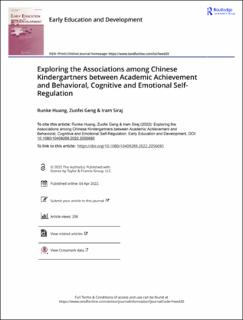Exploring the Associations among Chinese Kindergartners between Academic Achievement and Behavioral, Cognitive and Emotional Self-Regulation
Peer reviewed, Journal article
Published version
Permanent lenke
https://hdl.handle.net/11250/2995636Utgivelsesdato
2022-04Metadata
Vis full innførselSamlinger
Originalversjon
Huang, R., Geng, Z., Siraj, I. (2022) Exploring the Associations among Chinese Kindergartners between Academic Achievement and Behavioral, Cognitive and Emotional Self-Regulation. Early Education and Development. 10.1080/10409289.2022.2056695Sammendrag
Research Findings: Self-regulation is an important determinant of children’s developmental outcomes, but little research has explored its different facets simultaneously. This study aims to explore a sample of Chinese children’s behavioral, cognitive and emotional self-regulation characteristics by examining their gender and age differences, associations with academic outcomes and the moderating effects of age and gender on these associations. Results show that girls outperformed boys in behavioral and emotional self-regulation and K2 children failed to show any advantages on behavioral and emotional self-regulation compared with K1 children. All facets of self-regulation associated with children’s numeracy and literacy scores, while emotional self-regulation’s contribution was negative; neither age nor gender moderated these associations. Practice & Policy: The study considers Chinese children’s characteristics of self-regulation in terms of gender and age differences in the context of the broader literature. This study supports the contention that self-regulation may consist of different facets. Findings from this study also show the significance of self-regulation in preschoolers’ academic outcomes and the complex nature of these facets when they function on academic achievement.

